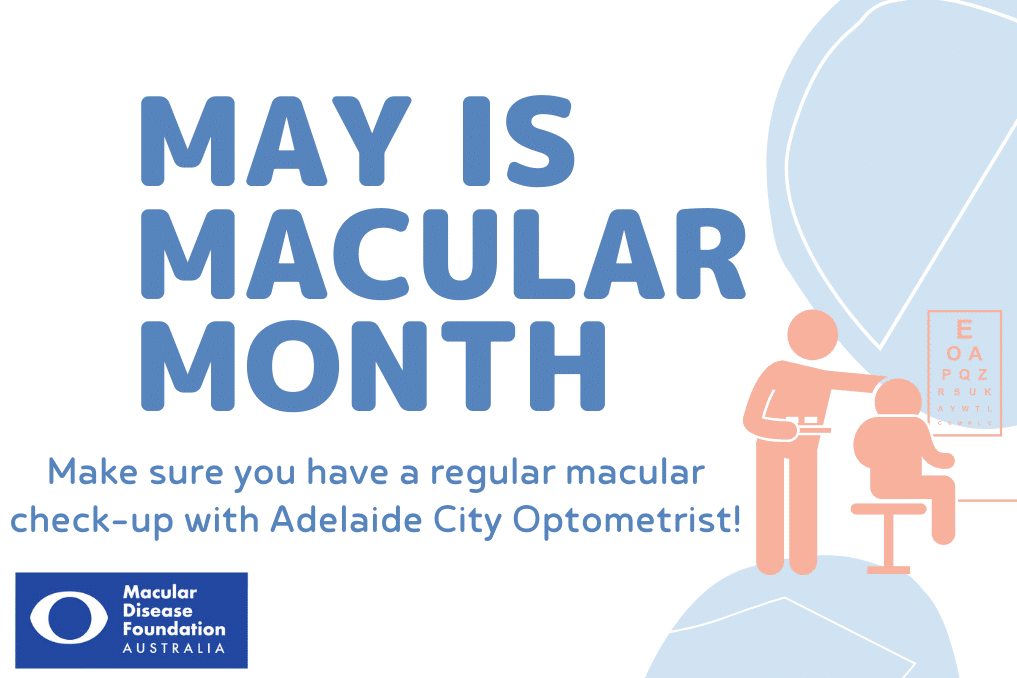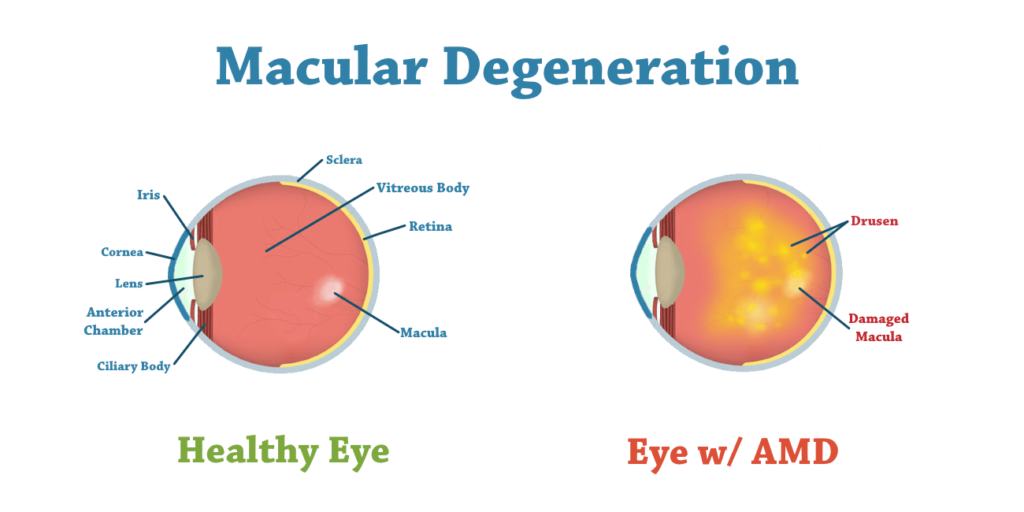
What is Macular Degeneration?
Macular Degeneration causes blurred or reduced vision loss in the centre of the filed of vision, and this is due to the thinning of the macula. There are two types of macular degeneration: dry and wet.
- Dry Macular is where the centre of the retina deteriorates (90% of patients)
- Wet Macular is where leaky blood vessels grow under the retina (abnormal blood vessels) (10% of patients)
The most common macular disease is an age-related macular degeneration (AMD) which is chronic and progressive. AMD is the leading cause of vision loss in the western world, accounting for almost 50% of all visually impaired cases.
Generally, an individual would not be diagnosed with macular degeneration until they are over 50 years old. However, if you experience any dry eye symptoms it is best to have a comprehensive eye exam with your local optometrist as they may be able to pin point the cause of the dry eyes.
What are the symptoms of Macular Degeneration?
Symptoms may not be obvious to you at first as you won’t experience any pain but if you have any of the following it could be a sign of early macular degeneration:
- Distortion of straight lines
- Dark, blurry areas in the centre of your vision
- Rarely, worse or different colour perception
If the condition worsens considerably it is possible to have loss of vision and people who have advanced MD are considered legally blind.
Risk Factors
Research suggests to avoid the following to reduce the risk of developing AMD:
- Stop smoking
- A diet containing fresh fruit and green leafy vegetables
- Increase intake of fish and omega rich foods
- Frequent eye examinations
- A diet rich in antioxidants, vitamins and minerals
When should you get checked out?
The disease does have a hereditary component, so if you know someone in your family who has AMD then it would be suggested to have an eye check up to avoid the risk factors. However, as mentioned it generally affects the older population.
What test’s are done for macular degeneration?
The test’s that we do to diagnose Macular Degeneration at ACO are the OCT and MTST Test, which are considered the gold standard for checking Macular.
- The Optical Coherence Tomography is an imaging method to take a picture of the back of the eye. This determines the state of eye health and whether you have any abnormalities with vision.
- The Macular Threshold Sensitivity Test measures sensitivity in four central points. This determines how sensitive you are to light which is generally a side effect of an age-related disease.
- Macula Screening Test (Amsler Grid) This is a tool that optometrist’s use to detect vision problems resulting from damage to the macula.
Test for Macular Degeneration
Amsler Grid
(Print this page for more effective results) This test is a good indicator of degeneration of the eyes, however, the results should determine whether you seek an eye test from an Optometrist who will give you the final result.
What is the best treatment for Macular Degeneration?
There is currently no cure for AMD, however, there are treatments that can help manage the side effects and general eye health for as long as possible.
Photodynamic Therapy (PDT) is a specialised laser therapy for the eyes. It uses a laser and special medicine that works when exposed to a certain type of light. Even though it is unable to restore vision you have already lost, but it may slow down the damage to your central vision.
Another option to help maintain eye health are the Macutec tablets.
Macutec is formulated specifically for people suffering with macular disease, with vitamins and nutrients to keep your eye healthy and slow down the process of macular degeneration.
Useful sites
Check My Macula is a great site which gives you the opportunity to find out if you have any symptoms related to macular degeneration. With only 5 questions it is a simple and recommended test. Also through their website you are able to find us as a recommended optometrist to visit for macular check-ups!
Find out all relevant information regarding Macular Degeneration and what the foundation aims to do each day for Australian’s dealing with the discomfort of Macular Degeneration.
What are Macular Problems?
Age-related macular degeneration (AMD) is an eye disease that may get worse over time. It's the leading cause of severe, permanent vision loss in people over age 60. It happens when the small central portion of your retina, called the macula, wears down.
What are the early warning signs of macular degeneration?
- Blurred or “fuzzy” vision. - Straight lines, such as sentences on a page, appearing wavy or distorted. - Blurry areas on a printed page. - Difficulty reading or seeing details in low light levels. Extra sensitivity to glare.
Where is the macula?
The macula is located near the center of the retina; its function is to process harp, clear, straight-ahead vision. The retina is the paper-thin tissue that lines the back of the eye and contains the photoreceptor (light sensing) cells (rods and cones) that send visual signals to the brain.
How long does it take to lose vision with macular degeneration?
In the late stages, you may have difficulty seeing clearly. Your doctor may advise surgery, or you may consider working with an occupational therapist. On average, it takes about 10 years to move from diagnosis to legal blindness, but there are some forms of macular degeneration that can cause sight loss in just days.
To book an eye examination with us, click the button below.
Book Appointment

